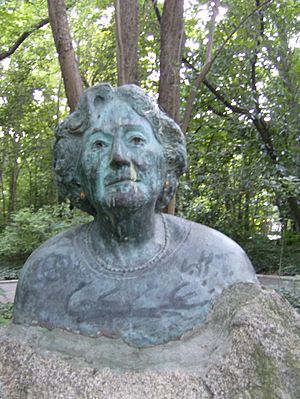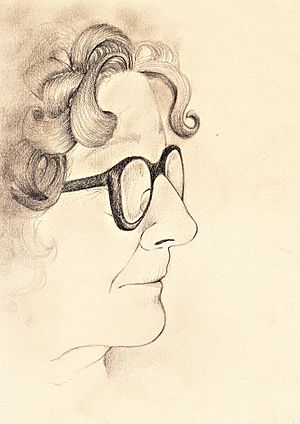Rosa Chacel facts for kids
Quick facts for kids
Rosa Chacel
|
|
|---|---|

Bust of Chacel in Valladolid (1988), by Francisco Baron (1931-2006)
|
|
| Born |
Rosa Clotilde Chacel Arimón
3 June 1898 |
| Died | 27 July 1994 (aged 96) Madrid, Spain
|
Rosa Clotilde Chacel Arimón (born June 3, 1898 – died July 27, 1994) was a well-known writer from Spain. She was born in Valladolid. Rosa Chacel is remembered for her unique writing style and for speaking up for women's rights.
Contents
Early Life and Education
Rosa Chacel was born in Valladolid. Her mother was a teacher. In 1908, Rosa moved to Madrid to live with her grandmother. Because she was often sick, her mother taught her at home.
In 1909, Rosa started studying drawing at a school in Madrid. Later, she followed her teacher to a new school. There, she began to develop ideas about feminism. This means she believed women should have the same rights and opportunities as men. In 1915, Rosa became interested in sculpture. She joined a famous art school, but she soon decided sculpture was not for her. She left the school in 1918.
Rosa then spent time at popular spots in Madrid. These included the Cafe Granja del Henar and the Ateneo de Madrid. These places were meeting points for new writers. Rosa gave a speech there about women's roles. At that time, many people in Spain held traditional views about women. They thought women should only be homemakers. Rosa's ideas were seen as new and different by some.
Marriage and Early Career
Rosa Chacel continued to support women's rights. In 1921, she married Timoteo Perez Rubio, a famous painter. In 1922, they moved to Rome. Timoteo had won a scholarship to study art there. That same year, Rosa wrote her first article for a magazine called Ultra. In 1927, she and her husband returned to Madrid.
In 1930, Rosa wrote her first novel, "Estacion, Ida y Vuelta". Later that year, Rosa and Timoteo had a son named Carlos. For the next three years, Rosa focused on being a mother. She also worked to promote her new book. In 1933, she lived alone in Berlin for six months. This helped her recover from her mother's death and a period where she felt stuck creatively.
Soon after she came back to Spain, the Spanish Civil War began. Her husband joined the Republican Army. Rosa worked as a nurse and wrote for literary magazines. The war forced Rosa and her son to move many times. They lived in Barcelona, Valencia, and Paris. Meanwhile, her husband helped move valuable art from the Museo del Prado. He wanted to protect it from the war. After the war, the family reunited. They moved to Brazil, where they lived for 30 years. They also spent short times in Buenos Aires.
Life in Exile
For many years, Rosa Chacel was not as well-known. She was a respected writer but had not started many new projects. This changed in 1959. She won a special award called a Guggenheim Fellowship. This award allowed her to travel to New York City. There, she was able to focus on writing again.
Rosa worked in New York until 1961. By then, Spain was more peaceful. She returned to Spain for a short time. In May 1963, Rosa went back to Brazil. She stayed there until 1970, when she visited Spain again. She lived in Brazil for three more years. In 1973, she moved back to her home country for good.
Return to Spain and Later Life
In 1977, her husband of 56 years passed away. Rosa Chacel had often traveled between Madrid and Rio de Janeiro. After her husband's death, she decided to stay in Spain permanently. She used this time to bring back some of her older works. She also wrote more new novels.
Death and Legacy
Rosa Chacel passed away peacefully in Madrid on July 27, 1994. She was 96 years old.
The Spanish national airline, Iberia Airlines, honored Rosa Chacel. They named one of their Airbus A340 planes after her. This "Rosa Chacel Airbus A340" often flies between Madrid and cities like Buenos Aires or Rio de Janeiro. These were places where she lived during her life.
Awards and Honors
- She received a Guggenheim Fellowship in 1959.
- In 1989, the University of Valladolid gave her an honorary degree. This is called a Doctor Honoris Causa.
- Towards the end of her life, she won several important awards. Some of these were given by King Juan Carlos.
- In 1987, she won the "National Award of the Letters". This award is given to Spain's best writers.
- In 1990, she received the "Premio Castilla y Leon de las letras". The King chooses the winners of this award.
Images for kids
See also
 In Spanish: Rosa Chacel para niños
In Spanish: Rosa Chacel para niños




